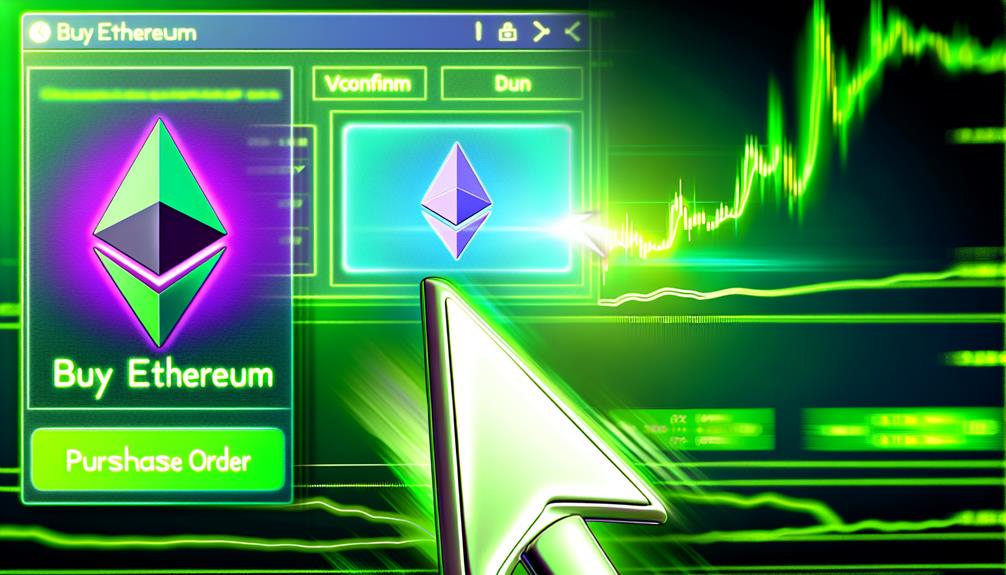When you're considering buying Ethereum, the process can seem intimidating at first, but it doesn't have to be. You'll want to start by selecting a trustworthy cryptocurrency exchange that fits your needs, while also ensuring your financial safety. Once you've set up a secure wallet and funded your account, the next steps are essential for making informed decisions. However, understanding the nuances of placing your purchase order and securing your Ethereum assets can greatly impact your investment strategy. What should you know before you make that first purchase?
Understand Ethereum Basics

To grasp the fundamentals of Ethereum, it's essential to recognize that it's not just a cryptocurrency but a decentralized platform that enables the creation of smart contracts and decentralized applications (dApps). Launched in 2015 by Vitalik Buterin and a team of co-founders, Ethereum's history is marked by its innovative approach to blockchain technology. Unlike Bitcoin, which primarily serves as a digital currency, Ethereum allows developers to build complex applications that can operate autonomously.
Smart contracts are at the core of Ethereum's functionality. These self-executing contracts with the terms directly written into code eliminate the need for intermediaries, reducing costs and increasing efficiency. For instance, a smart contract could automate the process of executing a financial agreement, ensuring that all conditions are met before any transaction occurs. This capability has attracted various industries, from finance to supply chain management, enthusiastic to leverage blockchain's transparency and security.
As Ethereum continues to evolve, the introduction of upgrades such as Ethereum 2.0 aims to address scalability and energy efficiency challenges. This shift to a proof-of-stake consensus mechanism is pivotal for enhancing transaction speeds and reducing environmental impact, further solidifying Ethereum's role in the blockchain ecosystem. By understanding these basics, you'll be better prepared to navigate the complexities of purchasing and utilizing Ethereum in today's digital economy.
Choose a Cryptocurrency Exchange
With countless cryptocurrency exchanges available, selecting the right one can greatly impact your Ethereum purchasing experience. When evaluating exchanges, it's vital to take into account factors such as exchange fees and trading limits, as these can greatly influence both your costs and your ability to trade effectively.
Exchange fees can vary widely between platforms. Some exchanges charge a flat fee per transaction, while others implement a percentage-based model. This means that if you're planning to make large purchases, a platform with lower fees will save you money in the long run. For instance, a 0.1% fee on a $1,000 transaction would cost you $1, while a 1% fee would set you back $10. Keep in mind that some exchanges may also have hidden fees, such as deposit and withdrawal charges, so it's important to read the fine print.
Trading limits are another significant aspect to take into account. Some exchanges impose daily or monthly limits on how much Ethereum you can buy or sell, which can be frustrating if you're looking to make considerable investments. If you're a low-volume trader, these limits may not affect you, but if you anticipate trading frequently or in large amounts, choose an exchange that offers higher or more flexible limits.
Set Up Your Wallet

Setting up a wallet is essential for securely storing your Ethereum once you've purchased it. Choosing the right wallet type is important, as it affects both accessibility and wallet security. There are three primary wallet types you should consider:
- Hardware Wallets: These are physical devices that store your private keys offline. They offer robust security against hacking attempts and are ideal for long-term storage.
- Software Wallets: These can be downloaded as apps on your computer or smartphone. While they provide easier access to your Ethereum for transactions, they're more vulnerable to malware and phishing attacks.
- Paper Wallets: This method involves printing your public and private keys on paper. Although it's highly secure from online threats, it can be easily lost or damaged, leading to permanent loss of funds.
When setting up your wallet, prioritize wallet security. Make sure that you create strong passwords, enable two-factor authentication where possible, and back up your wallet. Regularly updating your software wallet can also help protect against security vulnerabilities.
It's important to remember that once you purchase Ethereum, your wallet becomes a target for hackers. Thus, understanding the strengths and weaknesses of different wallet types will empower you to make informed decisions. By implementing best practices for wallet security, you can safeguard your investment and enjoy peace of mind as you navigate the world of Ethereum.
Fund Your Account
To fund your account for purchasing Ethereum, you'll need to choose a payment method that suits your needs, whether it's a bank transfer, credit card, or another option. Ensuring your funds are deposited safely is essential, as security breaches can lead to significant losses. Finally, verifying your account enhances your transaction limits and boosts your confidence in the platform's reliability.
Choose a Payment Method
Selecting a payment method is an essential step when you're ready to fund your account for purchasing Ethereum. Each option comes with its own advantages and drawbacks, so it's vital to understand them before proceeding. Here are three common methods you might consider:
- Credit Card Options: Using a credit card can be the quickest way to buy Ethereum. You'll benefit from immediate processing times, but be aware of potential fees and interest rates that could apply.
- Bank Transfer: This method typically involves a longer processing time but can offer lower fees compared to credit cards. If you're looking to invest larger amounts, bank transfers may provide a more cost-effective solution.
- Payment Processors: Some exchanges allow payments through services like PayPal or other virtual wallets. This option can add convenience and security, but be cautious of higher transaction fees.
Deposit Funds Safely
Depositing funds safely into your account is critical for a smooth Ethereum purchasing experience. Proper fund management is essential, as it guarantees that your investment remains secure while minimizing exposure to potential losses. Start by selecting a reputable exchange that offers robust security measures such as two-factor authentication and encryption protocols.
Before depositing, conduct a thorough risk assessment. This involves understanding the volatility of Ethereum and the implications of investing in a highly fluctuating asset. Make certain to only deposit amounts you can afford to lose, especially during market downturns.
Consider using secure payment methods, like bank transfers or credit cards, which often provide buyer protection. Avoid using less secure options, like cash transactions or wire transfers to unknown recipients, as these can lead to irreversible losses.
Moreover, regularly monitor your account for any unauthorized transactions. If you notice anything suspicious, act quickly. Keeping your funds in a secure wallet, rather than leaving them on an exchange, can also enhance your safety. By taking these precautions, you'll enhance your fund management strategy and considerably reduce the risks associated with purchasing Ethereum.
Verify Your Account
After guaranteeing your funds are deposited safely, the next step is verifying your account. This is essential for securing your investments and complying with regulations. Most platforms require you to complete an identity confirmation process to prevent fraud and guarantee security.
Typically, you'll encounter several account verification methods, which may include:
- Government-Issued ID: Upload a clear image of your driver's license or passport. This helps confirm your identity.
- Proof of Address: Provide a recent utility bill or bank statement that shows your name and address. This verifies your residence.
- Selfie Verification: Some platforms ask for a selfie to match your appearance with your ID. This adds an extra layer of security.
Completing the identity confirmation process can take anywhere from a few minutes to several days, depending on the platform's efficiency. It's important to follow the instructions carefully to avoid delays. Once your account is verified, you'll be set to buy Ethereum confidently, knowing that your identity is protected and your transactions are secure.
Place Your Purchase Order

Executing a purchase order for Ethereum requires a clear understanding of market dynamics and your own investment goals. Before placing your order, it's essential to analyze current market trends, as they can notably influence the price of Ethereum. Study charts and metrics to identify patterns that may indicate potential price movements. This analytical approach will help you determine whether it's a favorable time to buy.
When placing your purchase order, you'll typically have two main options: market orders and limit orders. A market order buys Ethereum at the current market price, ensuring a swift transaction but potentially exposing you to price volatility. On the other hand, a limit order allows you to set a specific price at which you want to buy. This trading strategy can be beneficial if you're aiming to purchase Ethereum at a lower price, but it may not execute immediately.
It's also wise to reflect on your investment horizon. If you're looking for short-term gains, you might adopt a more aggressive trading strategy, reacting quickly to market fluctuations. Conversely, if you're a long-term investor, you might prioritize accumulating Ethereum gradually, regardless of short-term price changes.
Secure Your Ethereum
Once you've successfully purchased Ethereum, securing your investment is vital to protect against potential threats such as hacks or loss of access. Effective Ethereum security involves several important strategies to safeguard your assets.
- Use Hardware Wallets: Opt for a hardware wallet, which stores your private keys offline, making it nearly impossible for hackers to access your funds. These devices are specifically designed for wallet protection and enhance transaction safety.
- Implement Two Factor Authentication (2FA): Always enable two factor authentication on your exchange accounts and wallets. This adds an extra layer of security, requiring not only your password but also a second verification step, such as a text message code or authenticator app.
- Practice Private Key Management: Your private keys are the keys to your Ethereum. Make sure they're stored securely, never shared, and preferably kept offline. Regularly review your key management practices to avoid falling victim to phishing attacks or accidental loss.
Additionally, maintaining phishing awareness is essential. Always scrutinize URLs and emails to avoid scams aimed at compromising your wallet. Finally, make certain to create secure backups of your wallet data to recover your assets in case of device failure or loss. By implementing these strategies, you'll greatly enhance your Ethereum security and protect your investment against potential threats.
Frequently Asked Questions
What Are the Tax Implications of Buying Ethereum?
When you buy Ethereum, you should consider tax regulations. The purchase itself isn't a taxable event, but selling or trading it may trigger taxes on capital gains, impacting your financial planning considerably. Always consult a tax professional.
Can I Buy Ethereum With Cash?
You can buy Ethereum with cash through local exchanges that accept cash purchases. It's crucial to research these platforms, as some may have varying fees and regulations, impacting your overall transaction experience and costs.
How Do I Track Ethereum Price Fluctuations?
To track Ethereum price fluctuations, you can utilize Ethereum price indicators and perform Ethereum market analysis. Websites and apps provide real-time data, enabling you to analyze trends and make informed decisions based on accurate information.
What Are Ethereum Gas Fees?
Ethereum gas fees are transaction costs based on gas price volatility and gas fee calculation. They fluctuate due to network demand, impacting your overall expenses when interacting with the Ethereum blockchain. Understanding this is essential for budgeting.
Is Ethereum a Good Long-Term Investment?
When considering Ethereum as a long-term investment, its potential lies in technological advancements and adoption. You should analyze investment strategies, weigh market trends, and assess risk to determine if it fits your portfolio goals.
Conclusion
To sum up, buying Ethereum involves careful planning and strategic choices. Did you know that as of 2023, Ethereum's market cap exceeds $200 billion, positioning it as the second-largest cryptocurrency? This highlights its significance in the digital asset landscape. By understanding the basics, selecting a reliable exchange, securing your wallet, and funding your account wisely, you can confidently invest in Ethereum. Stay informed and make data-driven decisions to navigate this evolving market effectively.
